|
|
|
Sort Order |
|
|
|
Items / Page
|
|
|
|
|
|
|
| Srl | Item |
| 1 |
ID:
144932
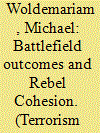

|
|
|
|
|
| Summary/Abstract |
This article uses data from the Eritrean war for independence to refine existing theories of rebel fragmentation. The author argues organizational performance affects the emergence of factional infighting within rebel organizations in unique and novel ways. While battlefield losses increase the likelihood of internal fragmentation, so do battlefield gains. The implication is battlefield stalemates possess unique properties that promote organizational cohesion in war, a relationship this study refers to as “cohesive stalemates.” The article extends an emerging literature on the internal politics of insurgent groups that has linked the coherence of rebel organizations to rebel losses.
|
|
|
|
|
|
|
|
|
|
|
|
|
|
|
|
| 2 |
ID:
189282
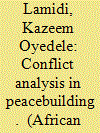

|
|
|
|
|
| Summary/Abstract |
Studies have examined the dimensions and components of conflict analysis. However, little or no review attention has been paid to understanding the conceptual perspectives, theoretical underpinnings and methodological issues. Hence, this paper aimed at filling the gaps and answered the basic questions: Is conflict analysis a potential tool for peacebuilding? In what ways does conflict analysis influence the practice of peacebuilding? How can conflict analysis cover the limitations of peacebuilding? Using secondary data sources, this paper underscored the perspectives and theoretical discourse which underpin the context and structural dynamics of conflict analysis. It also discussed methodological issues by exposing its different levels of practical benefit. Evident examples of conflict analysis were reviewed with notable instances in Africa. This paper, therefore, found out that conflict analysis has great potential for facilitating positive value and social coherence for peacebuilding practices. On the one hand, the outcome of conflict analysis has a direct response to the implementation of peacebuilding strategies. On the other hand, conflict analysis exposes complementary problems resulting in the limitations of peacebuilding. Also, this paper contributed to knowledge by remedying the limitations of peacebuilding. It concluded that a broad participation network would guarantee insightful conflict analysis towards the enhancement of peacebuilding.
|
|
|
|
|
|
|
|
|
|
|
|
|
|
|
|
| 3 |
ID:
111609
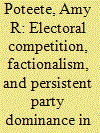

|
|
|
|
|
| Publication |
2012.
|
| Summary/Abstract |
The Botswana Democratic Party (BDP) has maintained a super-majority in the National Assembly for over forty years despite increasingly competitive elections. Several factors contribute to the BDP's continued legislative dominance, including features of the electoral system, fragmentation of the party system, and obstacles to strategic voting behaviour. Factional competition has played a particularly important role. Botswana's political institutions encourage factional competition, and factionalism interacts with the electoral system to hinder consolidation of the party system. Botswana's experience underlines the importance of internal party dynamics and their interaction with features of the electoral and party system in enabling the persistence of legislative dominance in competitive electoral systems.
|
|
|
|
|
|
|
|
|
|
|
|
|
|
|
|
| 4 |
ID:
179971
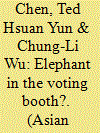

|
|
|
|
|
| Summary/Abstract |
In 2005, the single nontransferable vote system for legislative elections in Taiwan was replaced by a mixed-member majoritarian system, with an accompanying reduction in available district seats. In theory, by increasing the threshold of exclusion and placing the power of nomination in the hands of political parties, this reform should reduce vote-buying and local factionalism. We collected data on legislative nominees charged with vote-buying and on the local factional ties of candidates. Our results suggest that the reforms did reduce these problems. First, comparing the proportion of candidates charged with vote-buying before and after the reform shows a decrease in the second and third post-reform elections. Second, factional status predicts a candidate’s likelihood of running in consecutive elections before the reform but not after. Differences between factional and nonfactional candidates ceased to be significant after the reform, revealing the decreasing relevance of factions.
|
|
|
|
|
|
|
|
|
|
|
|
|
|
|
|
| 5 |
ID:
156262
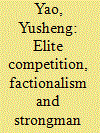

|
|
|
|
|
| Summary/Abstract |
This study examines the elite political competition in a large agrarian village in Hubei Province. Although known locally as well-governed, this village was actually a bifurcated political community with a host of problems. The power struggle between a few members of the village’s political elite in the past two decades focused on the office of village Party secretary and produced a polarized politics of factionalism. The town Party committee played a crucial role in selecting the village’s Party secretary for economic development with dubious results. This study also examines how and why a strongman Party secretary could hold on to power for 16 years despite an increasing opposition. It reveals the governing dilemma for a village that was hard to govern and the unintended consequences of the Party’s recruitment policy for village leaders. Through the elite competition for the past two decades this study aims to capture a total picture of the village politics including its political ecology, agency and dynamics.
|
|
|
|
|
|
|
|
|
|
|
|
|
|
|
|
| 6 |
ID:
142087
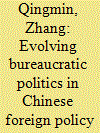

|
|
|
|
|
| Summary/Abstract |
Growing economically more powerful and confident, China is exerting unprecedented influence on global affairs. But the diverse voices and sometimes inconsistencies in its foreign policy behavior have confused many China watchers. Such phenomena demonstrate some new trends in Chinese foreign policy. In order to unveil such trends, this paper intends to look at Chinese foreign policy practices by employing the theoretical framework of bureaucratic politics. Its conclusion is that the foreign policy-making process of the People’s Republic of China (PRC) has progressed from the ideology based in-party factionalism of “line battles” to interest-based government politics of organizational competition. The early stage has distinctive Chinese characteristics, which are different from Western bureaucratic politics. But as Chinese society becomes more diversified, the bureaucratic politics in China begins to share more similarities with those in the Western democracies. Such trends render the application of Foreign Policy Analysis (FPA) to the research of Chinese foreign policymaking both necessary and beneficial to the construction of theories of foreign policy analysis, as well as research on China’s foreign policy itself.
|
|
|
|
|
|
|
|
|
|
|
|
|
|
|
|
| 7 |
ID:
168245
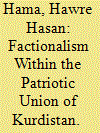

|
|
|
|
|
| Summary/Abstract |
Institutional conflicts within the Patriotic Union of Kurdistan (PUK) have existed ever since the party’s founding in 1975 as a result of a merger of three different factions. The conflicts were successfully managed in a way that did not hurt the party’s overall functioning until the Gorran movement, led by Nawshirwan Mustafa, split off in 2009. However, it was the withdrawal of party leader Jalal Talabani from political and public life due to a stroke suffered in 2012 that most damaged the party’s ability to function, and widened factional cracks within the organization. The absence of Talabani led to the emergence of intense competition between various groups within the PUK for influence and positions. Consequently, PUK policies on a number of important issues in Iraqi Kurdistan have been indecisive and weak since approximately 2013. This research will discuss the PUK’s inconsistent policies and their negative implications for the Kurdistan Region. Furthermore, it will argue that the PUK’s internal conflicts emboldened its rival, the Kurdistan Democratic Party, between the years 2014 and 2018.
|
|
|
|
|
|
|
|
|
|
|
|
|
|
|
|
| 8 |
ID:
133096
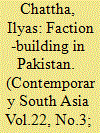

|
|
|
|
|
| Publication |
2014.
|
| Summary/Abstract |
This essay provides new evidence on local Pakistani politics in the immediate post-independence period. It reveals that far from being a period of national unity and service to the fledgling state, the country was mired in faction-building strategies between political rivals, competing for power and scrambling for resources, with debilitating consequences for democratic consolidation. While the new sources - largely based upon the archival records deposited at the National Documentation Centre, Islamabad - provide material relating primarily to Punjab, this essay demonstrates that the tensions between central government and the provinces can only be comprehended by reference to studies of localities.
|
|
|
|
|
|
|
|
|
|
|
|
|
|
|
|
| 9 |
ID:
152023
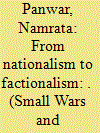

|
|
|
|
|
| Summary/Abstract |
Do ceasefires or peace talks create fragmentation in the insurgent groups? Rather than proposing claims that can offer predictions about armed groups behaviour under ceasefires or peace processes, the analysts tend to focus largely on the dynamics between state and non-state actor. The experts pay little attention to overtime changes in social and local political context which might contribute to propelling a rebel group towards fragmentation and factionalism. The present study intends to fill this gap by exploring the shifting role of public opinion and ethnic support for the peace talks to ascertain whether it can increase the likelihood of factionalism in rebel groups or not. This article applies this approach to the case of Naga National Movement (1947–2015) in India, and finds that the proposed variable appears to have increased the frequency of factionalism in the movement.
|
|
|
|
|
|
|
|
|
|
|
|
|
|
|
|
| 10 |
ID:
172360


|
|
|
|
|
| Summary/Abstract |
This article examines the two major and prolonged insurgencies that the Roman empire faced in Judaea in the first and second centuries C.E. It seeks to explain the historical contexts for these conflicts and to discuss the strategies pursued by both the imperial power and its insurgent enemies. In each case, once insurrection had broken out, the Roman authorities proceeded in a methodical manner involving the concentration of maximum force to achieve the goal of suppression. On the other hand, their Jewish enemies sought out adaptive responses that took account of the overwhelming imperial strength and applied the lessons learned from the failure of the First Revolt to re-imagine the course of opposition in the Second. The use of exemplary violence as a coercive tool of policy is discussed as is the challenge of dealing with an internally fractured and factionalized population.
|
|
|
|
|
|
|
|
|
|
|
|
|
|
|
|
| 11 |
ID:
160424
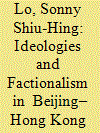

|
|
|
|
|
| Summary/Abstract |
Clashes between the ideologies of pro-Beijing nationalism and pro–Hong Kong localism have become far more prominent in the Hong Kong Special Administrative Region since 2013. This article explores the origins, content, and impact of the ideological conflicts between Beijing and Hong Kong.
|
|
|
|
|
|
|
|
|
|
|
|
|
|
|
|
| 12 |
ID:
114785
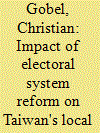

|
|
|
|
|
| Publication |
2012.
|
| Summary/Abstract |
This article discusses specific impacts of the abolishment of the single non-transferable vote (SNTV) in Taiwan. The SNTV had long been seen as a major factor in the sustenance of county- and township-level clientelist networks. It was associated with extremism, candidate-centered politics, vote-buying, clientelism and organized crime involvement in politics. This article examines the impact of the electoral reform on the mobilization capacity of a local faction in a rural county notorious for its factionalism. The analysis indicates that the clientelist structures are too resilient to be affected by even a radical electoral reform.
|
|
|
|
|
|
|
|
|
|
|
|
|
|
|
|
| 13 |
ID:
084365
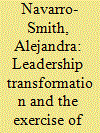

|
|
|
|
|
| Publication |
2008.
|
| Summary/Abstract |
This article presents an ethnographic analysis of three indigenous leadership types and their formation in contemporary Chiapas. In their interaction with state institutions-and with its policies for political organization and economic development, these cases show the leadership strategies they use to benefit their communities and to help understand local definitions of power. In San Jer nimo Tulij , the area under study, the regional state formation process is the historical framework where local practices and beliefs are shaped and reshaped during daily interactions. This paper shows how some communitarian factions were formed in the context of commercial interactions introduced by development projects brought into the state; these evolved into political divisions that are still recognizable in the context of the low intensity warfare experienced in this region. Therefore, an anthropological-historical perspective is needed to grasp how fighting in or against the Zapatista Army of National Liberation (EZLN) is closely linked to historic local struggles and disputes.
|
|
|
|
|
|
|
|
|
|
|
|
|
|
|
|
| 14 |
ID:
113655
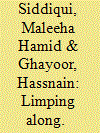

|
|
|
| 15 |
ID:
178260
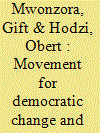

|
|
|
|
|
| Summary/Abstract |
Nelson Chamisa is central to the political terrain of contemporary Zimbabwe. Post the soft coup of November 2017 and the death of Morgan Tsvangirai in early 2018, Chamisa became president of the Movement for Democratic Change party and contested the July 2018 presidential election. The tempo of changes in the Movement for Democratic Change presidency is not related directly to the shift from Mugabe to Mnangagwa. However, broader politics formed an important context for Chamisa’s contested claim for the Movement for Democratic Change presidency. In examining Chamisa and the Movement for Democratic Change, the article highlights linkages between personality politics and electoral mobilization, and how this relates to political party institutionalization.
|
|
|
|
|
|
|
|
|
|
|
|
|
|
|
|
| 16 |
ID:
120908
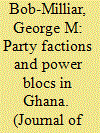

|
|
|
|
|
| Publication |
2013.
|
| Summary/Abstract |
Competition for the executive leadership of a political party and the distribution of state patronage in Ghana is influenced by factional alignments and group interests. In December 2008 the National Democratic Congress (NDC) regained political power, and within months rifts appeared over the allocation of ministerial portfolios. The intra-party murmurings became public when two factions supported rival candidacies for the party's presidential nomination. The pro-Rawlings faction supported the candidacy of Nana Konadu Agyemang-Rawlings, and the anti-Rawlings bloc backed President John Evans Atta Mills. Drawing on Boucek's (2009) typology of factionalism, this article argues that factionalism within the NDC is a dynamic and complex process of informal groupings competing and jockeying for power to satisfy members' interests. It draws three conclusions: party factions are ad hoc groupings that are nurtured into a power bloc, and are constellated around particular individuals; factional conflicts are not rooted in ideology, but are based on differences in policy goals, interests and patronage; and, finally, factionalism fluctuates between cooperative and competitive phases.
|
|
|
|
|
|
|
|
|
|
|
|
|
|
|
|
| 17 |
ID:
144174
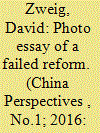

|
|
|
|
|
| Summary/Abstract |
In mid-1975, Deng Xiaoping, with Mao’s blessing, initiated reforms that targeted the negative consequences of the Cultural Revolution. To bolster Deng’s effort, Mao endowed him with penultimate authority over the Party, government, and military. However, in late October, Mao turned on Deng, and within five months, Mao and the radicals toppled Deng from power. As a foreign student at Peking University, David Zweig observed and photographed four key points in this historic struggle: (1) the initial establishment of a “big character poster” compound at Peking University; (2) emotional mourning for Zhou Enlai in Tiananmen Square following his death: (3) the intensified assault on Deng in February 1976 in the posters at Peking University; and (4) the massive demonstration of support in Tiananmen Square on 3-4 April for the end of Maoist politics.
|
|
|
|
|
|
|
|
|
|
|
|
|
|
|
|
| 18 |
ID:
088366
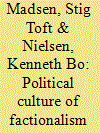

|
|
|
|
|
| Publication |
2009.
|
| Summary/Abstract |
The experience of international migration is generally found to turn migrants into culturally hybrid communities. Yet, migrant communities often hold on to their religious moorings even as they relocate. From the 1970s onwards, the emerging leadership of Hindu settlers in Denmark consciously tried to transfer with them what they saw to be key aspects of Hinduism as they migrated to Denmark. In 1985, Hindus organized a major conference to position the Vishwa Hindu Parishad (World Hindu Council) as the umbrella organization for Hinduism in Denmark. Later on they established a Temple of Indians called Bharatiya Mandir to provide a place of worship for local Hindus. The philosophy behind the temple conformed to the nondenominational Hindu nationalist vision of Hindus as a unified community. This article, which contrasts the aim of Hindu nationalism with the on-the-ground realities of Hindu mobilization in Denmark, reveals that two major factions spearheaded Hindu nationalist endeavors in Denmark from the 1980s until 2006. The two factions successfully launched several projects, and even collaborated in their execution, but the initiatives were beset with rivalries that hampered the communal unity they had set out to achieve. The authors analyze this factional rivalry as an expression of Indian political culture, arguing that tensions among Hindu activists in Denmark is an instance of the political factionalism prevalent in the Indian subcontinent. The unintended emergence of such factionalism represents the successful transfer of a core element of Indian political culture to a new locale through Hindu nationalist politics. The authors base their argument on field observations since the 1980s, recent interviews with key religious players, and more than two hundred pages of written materials that offer a rare entry point to the study of Hindu nationalism ex situ.
|
|
|
|
|
|
|
|
|
|
|
|
|
|
|
|
| 19 |
ID:
187545
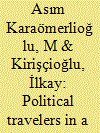

|
|
|
|
|
| Summary/Abstract |
This article intends to broaden our understanding of Turkish politics of the 1950s by focusing on the Freedom Party (1955–1958) (FP) founded by the former leading members of the Democrat Party (DP). Unlike earlier studies which mostly concentrate on the ideology and the leading political figures of the party, an attempt has been made to locate this experience in its historical context. After presenting a detailed account of the literature, we analyze the party by focusing on the power struggles of the internal factions inside the DP. By so doing, this study suggests that factionalism was a major cause of many noteworthy political developments of the era. Moreover, rather than strict ideological differences, we argue that this factionalism rested upon personal disputes and micropower struggles. Thus, the FP was born out of the DP not simply as a result of social discontent, but mainly of factionalism from within.
|
|
|
|
|
|
|
|
|
|
|
|
|
|
|
|
| 20 |
ID:
102751
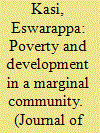

|
|
|
|
|
| Publication |
2011.
|
| Summary/Abstract |
The concepts of poverty and development have many meanings in contemporary globalized societies. Development by definition implies desired changes in terms of livelihood, improved quality of life and better access to assets and services, etc. However in reality development programmes sometimes have negative consequences, perhaps unintended, multiplying the acute scarcity of resources and opportunities, or reproducing poverty. Also, the consequences of developmental programmes often appear to be out of focus, and seen at the ground level, there seems to be a gap between what is intended and what is actualized. In this framework, this paper presents a case study of the social, cultural and economic correlates of the development processes in Adadakulapalle, a settlement of Sugali peoples, once a semi-nomadic tribe, in Anantapur District of Andhra Pradesh, South India. The paper shows how factionalism and faction politics affect the implementation of development interventions. It also looks at the poverty in the settlement and focuses on the types of change that people have experienced with the implementation of different schemes by both government and other agencies. The type of change is discussed in the present study through the macro and micro analysis of development programmes.
|
|
|
|
|
|
|
|
|
|
|
|
|
|
|
|
|
|
|
|
|